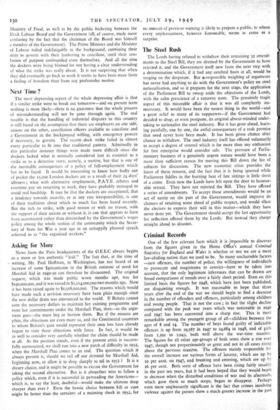Asking for More
News from the Paris headquarters of the 0.E.E.0 always begins as a more or less authentic "leak." The fact that, at the time of writing, Mr. Paul Hoffman, in Washington, has not heard of an increase of some $400,000,000 in the British estimate of need for Marshal Aid in 1949-50 can therefore be discounted. The original request, which was made public seven months ago, was for $940,000,000, and it was raised to $1,1z4,000,000 two months ago. Now it has been raised again to $t,518,oco,000. The reasons which would have made such a revision necessary have been plain enough since the new dollar drain was announced to the world. If Britain cannot earn the necessary dollars to maintain her existing programme and meet her commitments under the Marshall Plan, then—so the argu- ment goes—she must beg or borrow them. But if the reasons are plain, the objections are even more so, and the Continental countries to whom Britain's gain would represent their own loss have already begun to state those objections with force. In fact, it would be as well to consider very carefully whether the claim should be made at all. As the position stands, even if the present crisis is success- fully surmounted, we shall run into a new patch of difficulty in 1952, when the Marshall Plan comes to an end. The question which is always present is, should we tail off our demand for Marshall Aid, beginning now, or allow it to drOp sharply to nil in 1952? It is a dreary choice, and it might be possible to excuse the Government for taking the second alternative. But is it altogether wise to follow a policy which, even if it is successful in persuading the Americans— which is, to say the least, doubtful—would make the ultimate drop sharper than ever ? Even the heroic choice between kill or cure might be better than the certainty of a maiming shock in 1952, for no amount of previous warning is likely to prepare a public, to whom every unpleasantness, however foreseeable, seems to come as a surprise.


































 Previous page
Previous page